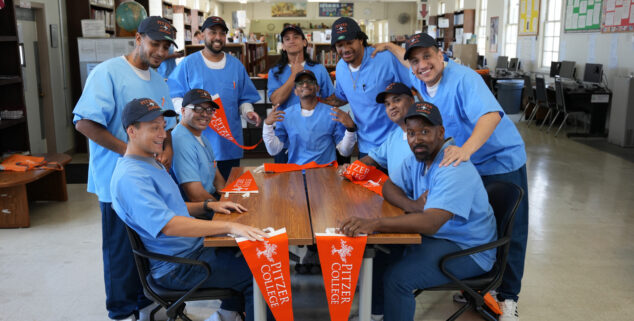Opinion
Inside prison walls, a new model of leadership is taking root
 CGU Prison Program. Photo courtesy of Drucker Studio.
CGU Prison Program. Photo courtesy of Drucker Studio. Capitol Weekly welcomes Opinions on California public policy or politics. Please read our guidelines for opinion pieces before submitting an Op-Ed.
OPINION – In a classroom with no windows, inside a California prison where the future is often measured by parole dates and time served, a different kind of transformation is taking place. Each week, a group of incarcerated men gather, not to count days, but to ask questions: What is our mission? What are our strengths? What must we leave behind?
Their curriculum isn’t designed around punishment or compliance. It’s built on the ideas of Peter Drucker, the father of modern management. At the California Rehabilitation Center in Norco, Drucker’s philosophy has found new relevance in the rehabilitation of people who are redefining what it means to lead.
California’s prison population has been steadily declining, projected to fall to 90,871 by mid-2025, a 3.1 percent drop over five years. Yet while fewer people may be behind bars, the need for programs that create meaningful change remains urgent. Higher education in prison reduces recidivism by 43 percent, but access is still limited. The question isn’t just how many people we incarcerate, but what happens next. This is where leadership, real leadership, comes in.
Where Theory Becomes Practice
At the front of the classroom stands Romarilyn Ralston, a lecturer and Executive PhD student at the Drucker School of Management and Senior Director of the Justice Education Center at the Claremont Colleges. She also spent 23 years incarcerated. Her presence is not theoretical. It’s lived.
Ralston brings Drucker’s writings to life not as abstractions, but as survival strategies. “Do the time, don’t let the time do you,” she tells students. For her, education is not a privilege, it is a right. And leadership starts with self-awareness and the courage to take responsibility. These aren’t new beliefs. They’re the same values Peter Drucker championed across decades of work.
Drucker saw management as a liberal art, a practice grounded in ethics, purpose, and human development. “The task of leadership,” he wrote, “is to create an alignment of strengths in ways that make a system’s weaknesses irrelevant.” That’s not just discussed in this prison classroom. It’s practiced.
One student, CJ, reflected on what that meant to him: “Everyone is an executive. If you can build a business, you can manage your life.” For CJ and his classmates, Drucker’s Managing Oneself isn’t about promotion. It’s about dignity.
Another student, Michael, took to Drucker’s emphasis on time. “Time wasted can’t be replaced,” he said. “Being effective is everything.” For him, learning to lead meant learning to choose. “You have to know the person to let them succeed.”
These aren’t hypothetical takeaways. They’re lifelines. Students study Management by Objectives not to check off metrics, but to define who they want to become. They learn about planned abandonment not as business strategy, but as permission to let go of old narratives. They explore the spirit of performance not to impress, but to heal.
In one session, a student reframed Drucker’s famous question—What is our mission?—as a prompt for imagining a future prison had once foreclosed. “Drucker taught me to plan,” said Dee, a former business owner. “To take risks. To open my mindset.” In that shift from fear to possibility, real rehabilitation begins.
The Ripple Effect of Human-Centered Leadership
Ralston reminds her students often: “When one person earns an education in prison, the entire community shifts—families, children, society.” She has seen it firsthand. Students become mentors. Fathers. Advocates. They begin leading not because they are free, but because they have learned to lead from within.
Ryan, another student, captured the power of this approach best. “What I admired most about Drucker’s book,” he said, “was how it applied to everyday life. It could be titled The Effective Individual. Time management. Decision-making. Priorities. It’s about understanding your value as a human being.”
In a system designed to isolate and dehumanize, this cohort is learning to reconnect with themselves and with others. For many, it’s the first time they’ve been asked to think of themselves as leaders. Not in the traditional sense, but in Drucker’s sense: as people who contribute.
Mildred Gil is a seasoned executive with over 25 years of experience in the financial industry and is a Content Curator for the Drucker Studio. Contributions from Romarilyn Ralston.
Want to see more stories like this? Sign up for The Roundup, the free daily newsletter about California politics from the editors of Capitol Weekly. Stay up to date on the news you need to know.
Sign up below, then look for a confirmation email in your inbox.

This is so exciting, excellent, and much needed. What Ms. Romarilyn Ralston is doing is changing communities through studies which is a great alternative to incarceration because the more they know the more they are able to grow from the inside out.
I really appreciate Romarilyn’s work and heart for those who may have never considered education as part of their self rehabilitation.
Thank you Ms. Ralston